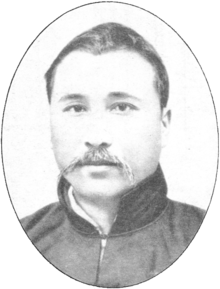- Chen Jiongming
-
Chen Jiongming
陳炯明
Personal details Born January 13, 1878
Haifeng, Shanwei, Guangdong, ChinaDied September 22, 1933 Nationality Chinese Occupation Lawyer
Politician
RevolutionaryChen Jiongming (simplified Chinese: 陈炯明; traditional Chinese: 陳炯明; Mandarin Pinyin: Chén Jiǒngmíng; Jyutping: Can4 Gwing2ming4, HKGCR:Chan Kwing Ming, Postal:Chen Kiung-Ming, Wade–Giles:Chen Chiung-Ming) was a revolutionary figure in the early periods of the Republic of China. Chen Jiongming was born in 1878 at Haifeng, Guangdong, China.
He was by training a lawyer and became a Qing legislator, a republican revolutionary, a military leader, a civil administrator and a federalist who sought to reconstruct China as a democratic republic. He joined the Chinese Revolutionary Alliance in 1909 and obtained the post of commander-in-chief of the Guangdong Army. He became the Military governor of Guangdong three times (1911-12, 1913, 1920-23) and civil governor of Guangdong from 1920 to 1922 and military governor of Guangxi from 1921 to 1922.
Chen was instrumental in backing Sun Yat-sen's Constitutional Protection Movement. He also restored Sun to power after the Guangdong-Guangxi War. Chen disagreed with Sun about the direction that reform should take. Sun wanted to unite the country by force and institute change through a centralized government based on a one-party system. Chen advocated a multiparty federalism with Guangdong becoming the model province and the peaceful unification of China. Sun became suspicious that the federalist movement was being exploited by the warlords to justify their military fiefdoms.
Relations deteriorated further when Sun became "extraordinary president", a move not condoned by the Provisional Constitution. It was Chen who first invited the Chinese Communist Party to Guangdong against Sun's objection that the Communists might dilute the movement. After the First Zhili-Fengtian War in 1922, there was a strong movement to reunite the northern and southern governments by having both Sun and Xu Shichang resign their rival presidencies in favor of restoring Li Yuanhong as president of a united republic. Chen was enthusiastic but Sun felt the new government would be a powerless puppet of the Zhili clique.
Sun Yat-sen and Chen Jiongming soon split over the continuation of the Northern Expedition. Sun conceived it to have begun with the occupation of Guangxi. From there he wished Chen to push into Hunan. After Wu Peifu of the Zhili clique in Beijing recognized his power in the south, Chen abandoned Sun. Unexpectedly revolting against the Kuomintang militarily in 1922, Chen led his forces to attack Sun's residence as well as office. Chen forced Sun to escape on a ship and delay his Northern Expedition.
With the help of Tang Jiyao, the KMT retook Guangzhou in 1923. Chen fled to Huizhou in eastern Guangdong after Sun's army defeated him. From 1923 to 1925, the Guangdong government organized two eastern campaigns against him and he fled to Hong Kong as his remaining forces were completely wiped out in 1925. He became an ally of Tang Jiyao, after Tang was expelled from the KMT following the Yunnan-Guangxi War. He was elected premier of the China Public Interest Party with Tang as his deputy. From Hong Kong, he criticized the Nationalists' single-party system and continued to advocate multiparty federalism. After the Japanese invasion of Manchuria, he attacked Chiang Kai-shek's regime for its refusal to confront Japan and he organized boycotts of Japanese products. He died of typhus on September 22, 1933.
Legacy


Chen is considered a traitor and reactionary warlord by both the Kuomintang and the CCP for his rebellion against Sun in 1922. Sun's party quickly began to publish literature about Chen to discredit him. The Communists, who had entered into an alliance with Sun and who still regard him as the founding hero of the Chinese Revolution have continued to characterize Chen as a counter-revolutionary.
His party defended him as a true revolutionary and democrat by pointing out the tragedies, misgovernance, and corruption caused by centralized, one party dictatorship. After the China Public Interest Party formed a united front with the Communists in 1947, Chen's role has been obscured to the point of invisibility in the party's official history. Other than his family, his most vocal apologist is Chinese writer Li Ao.
References
- Chen Jiongming (with photo)
- Chen Jiongming: Anarchism and the Federalist State
- The Zhuang and the 1911 Revolution
External links
- Center for Chen Jiongming Studies (Chinese)
- Center for Chen Jiongming Studies (English)
- University of Michigan Press Book: Chen Jiongming and the Federalist Movement
Warlord era in early Republic of China (1916–1930) Main events (1916–1920) Main events (1920–1930) Northern Factions Southern Factions Empire of China (1915–1916)
National Protection War (1915–1916)
Death of Yuan Shikai (1916)
Manchu Restoration (1917)
Constitutional Protection Movement (1917–1922)
Siberian Intervention (1918–1920)
Paris Peace Conference (1919)
May Fourth Movement (1919)
Occupation of Mongolia (1919–1921)Zhili–Anhui War (1920)
Guangdong–Guangxi War (1920–1921)
First Zhili–Fengtian War (1922)
Second Zhili–Fengtian War (1924)
Beijing coup (1924)
Yunnan–Guangxi War (1925)
May 30 Movement (1925)
Anti–Fengtian War (1925–1926)
Northern Expedition (1926–1928)
Huánggūtun Incident (1928)
Flag Replacement of the Northeast (1928)
Central Plains War (1930)Categories:- 1878 births
- 1933 deaths
- Deaths from typhus
- Infectious disease deaths in China
- People from Shanwei
- Republic of China warlords from Guangdong
- Governors of Guangdong
Wikimedia Foundation. 2010.
